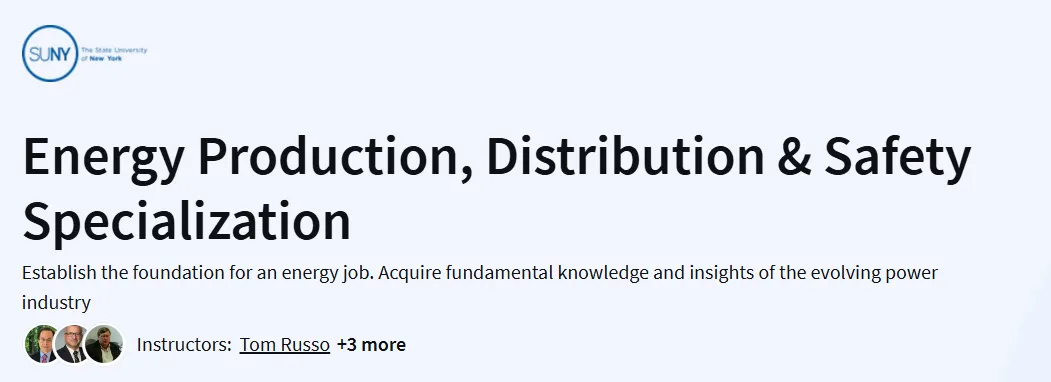What you will learn in Energy Production, Distribution & Safety Specialization Course
Electric Power Systems: Understand the standards and policies of the electric utility industry, including the components of the electric power system from generation to distribution.
Natural Gas Fundamentals: Learn about the properties, production, and distribution of natural gas, including safety protocols and industry standards.
Safety in the Utility Industry: Gain knowledge of safety practices in the utility industry, focusing on personal protective equipment, fire safety, and hazardous materials.
Energy Industry Overview: Explore the various facets of the power sector, including its structure, operations, and career opportunities.
Program Overview
Electric Power Systems
⏳ 12 hours
Content: Introduction to the electric power system, covering generation, transmission, and distribution components.
Skills Acquired: Basic electrical systems, electrical safety, and understanding of power grids.
Instructor: Ilya Grinberg
Natural Gas
⏳ 12 hours
Content: Overview of natural gas, including its properties, production processes, and distribution methods.
Skills Acquired: Understanding of natural gas systems and safety protocols.
Instructor: Richard Stempniak
Safety in the Utility Industry
⏳ 12 hours
Content: Focus on safety practices within the utility industry, including the use of personal protective equipment and handling hazardous materials.
Skills Acquired: Knowledge of safety standards and emergency response procedures.
Instructor: Martin Casstevens
Energy: The Enterprise
⏳ 12 hours
Content: Exploration of the energy sector’s structure, operations, and career opportunities.
Skills Acquired: Insights into the energy industry’s business aspects and career pathways.
Instructor: Tom
Get certificate
Job Outlook
Proficiency in Energy Production & Safety is valuable for roles such as:
Utility Technician
Safety Officer
Energy Analyst
Operations Manager
Skills acquired in this specialization are applicable across various industries, including energy production, utilities, and safety management.
Completing this specialization can enhance your qualifications for positions that require a solid understanding of energy systems and safety protocols.
Specification: Energy Production, Distribution & Safety Specialization
|
FAQs
- No prior engineering degree is required.
- Basic science knowledge is helpful but not mandatory.
- The course uses simplified explanations alongside technical examples.
- Suitable for beginners, industry professionals, and policymakers.
- Explains power generation from fossil fuels, renewables, and nuclear.
- Covers transmission and distribution systems.
- Highlights safety standards and risk management.
- Discusses challenges like efficiency, sustainability, and reliability.
- Learn how energy networks operate in real-world settings.
- Gain insights into safety protocols and regulatory standards.
- Understand grid reliability, fault detection, and emergency response.
- Develop awareness of sustainable and secure energy practices.
- Useful for roles in energy production, safety engineering, and compliance.
- Helps in careers with power companies, industrial plants, and regulators.
- Adds credibility for professionals working in sustainability and energy policy.
- Supports transitions into emerging fields like renewable energy safety.
- Explores renewable integration into traditional grids.
- Covers innovations in smart grids and digital monitoring.
- Discusses safety issues with new energy technologies.
- Examines global trends in sustainability and energy security.





